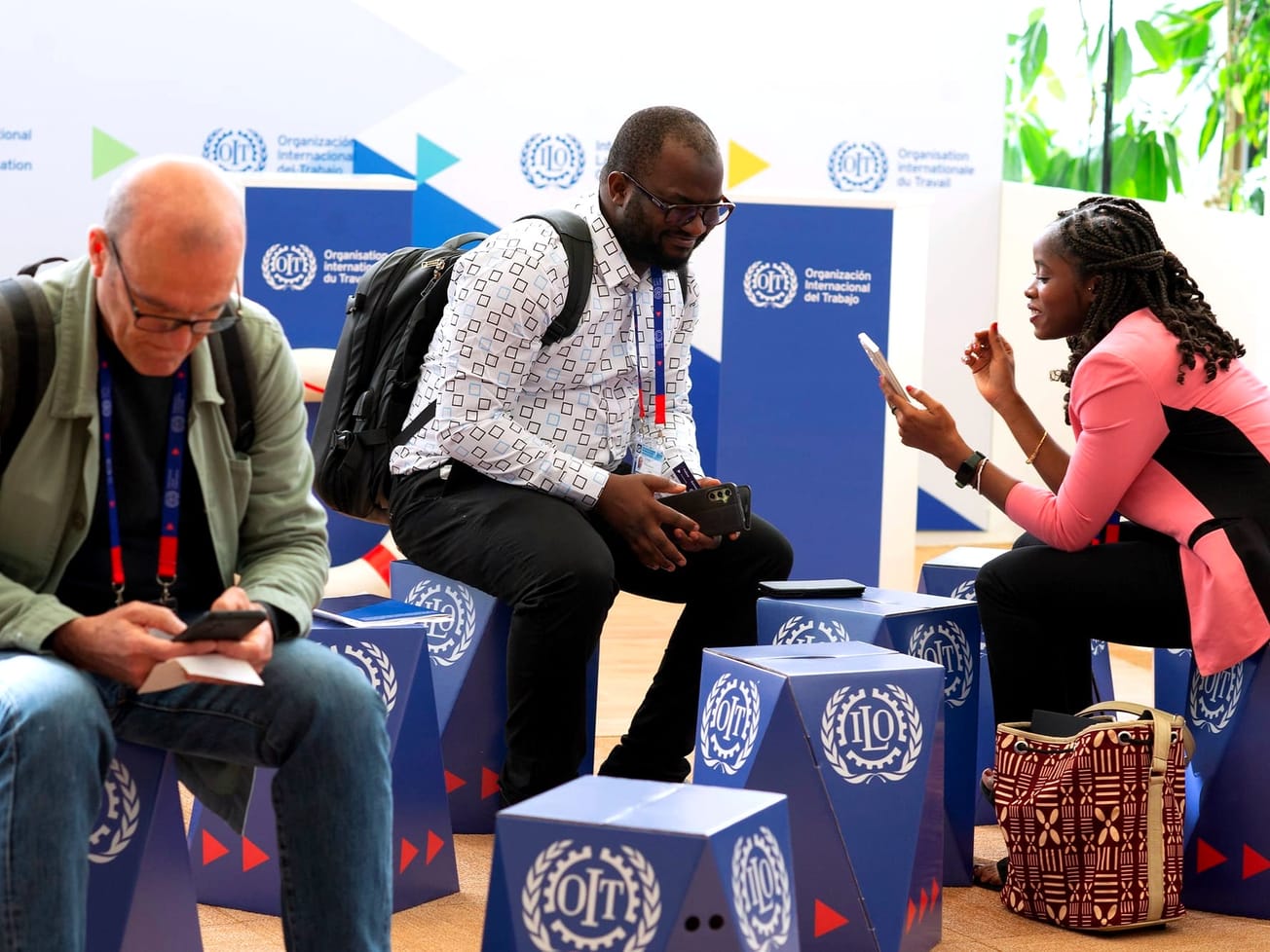GENEVA (AN) — Reflecting a world of instability and conflict, International Labor Organization Director-General Guy Ryder set a distinctly somber tone as he opened a one-day summit meant to explore the importance of decent jobs in building world peace, social justice and resilience.
The one-day summit was a highlight of ILO's annual high-level International Labor Conference, which drew more than 5,000 people including world leaders and foreign ministers. ILO's history is in many ways bound up with the quest to end world wars. Created in 1919 as part of the Treaty of Versailles, which ended World War I, ILO was awarded the Nobel Peace Prize on its 50th anniversary in 1969.
"We all have a stake in securing peace and resilience," Ryder told participants in the "World of Work Summit," webcast live from the United Nations' sprawling European headquarters in Geneva's Palais des Nations. "Disturbingly, I fear there are few signs of improvement in the near future."
The setting for his speech — referencing war, disasters, hunger, climate change and trade tensions — was fitting. He spoke in the former home of the League of Nations, the international organization created in 1920 to prevent another world war. The United Nations replaced it after World War II.
"We are here today," said Ryder, "because of the simple demand of hundreds of millions of women and men living in fragile and conflict-affected countries and disaster situations: the plea we hear time and again is for jobs, bread, freedom and dignity."
We all have a stake in securing peace and resilience because deep and persistent crisis endangers us all. There are echoes of this in our Constitution: “poverty anywhere constitutes a danger to prosperity everywhere.” @GuyRyder, World of Work Summit #ILC2018 pic.twitter.com/IUVdHhvbjd
— International Labour Organization (@ilo) June 7, 2018
Working for peace
The summit also heard from Ireland's President Michael Higgins — who noted ILO is the only global institution established in the wake of World War I that endured — and from Central African Republic's President Faustin-Archange Touadéra.
Higgins delivered a forceful speech to the ILO about the need for social justice, and it was hard to overlook the felicitous timing: his speech was delivered just days after he had publicly apologized on behalf of his nation to the more than 200 survivors of Ireland’s notorious Magdalene Laundries.
As a strongly conservative Catholic nation, Ireland confined at least 10,000 girls and women within the so-called laundries, a system of orphanages, industrial schools and forced homes for women who had become pregnant outside of marriage or because of sexual abuse, in the years between 1922 and 1996.
"So, let us heed once again the lesson of a century ago that peace does not simply rest on common markets, come as residue or facilitating condition to the markets, but upon a global solidarity, intellectually powerful, built on adequate literacy of the economic and the fiscal, one dedicated to the realization of social justice and equality for all our peoples, equality in all its forms, gender equality, economic equality, social equality, and equality of opportunity," Higgins told the ILO summit.
"That is how peace will be built and maintained in this century," he said, "a century that must, in new and ever-changing conditions, craft the experience of work within a sustainable, ethical global citizenship."
We must be more than hopeful. We must be committed to action. The #ParisAgreement and the #SDGs will enable us to meet the challenges of our century & build a lasting peace. Decent work, gender equality, and climate justice are at their very core. @PresidentIRL now at #ILC2018 pic.twitter.com/7LuJSh6JAX
— ILO_Live (@ILO_live) June 7, 2018
Work leads to 'strengthening of resilience'
Touadéra, a former prime minister and mathematics professor, won election in 2016 as president of Central African Republic, where most people live in poverty. He has repeatedly emphasized a need for greater security and justice for serious human rights abuses, but critics say much more must be done.
His nation has been plagued by conflict since 2013, when a predominantly Muslim rebel coalition overthrew the government and Christian militias fought back. The fighting intensified this past year, displacing almost 700,000 civilians and creating a dangerous arena for delivering humanitarian aid.
The conflict, Touadéra said in French, has "considerably reduced the state's capacity in all parts of the country to provide the population with the basic services they require for their well-being" and it also has uprooted about a third of the population from their homes, putting them at serious risk of harm.
"Our starting point is that the opportunity for employment which creates income and wealth is a major part of peace-building and the strengthening of resilience in the Central African Republic," he said.
The battle for the promotion of decent work for peace and resilience is a daily challenge for us. Despite the difficulties, I am here to tell how we are overcoming the obstacles on the road to peace. Mr. Faustin-Archange Touadéra, Pres. of Central African Republic #ILC2018 pic.twitter.com/FbG4gZYk4Q
— International Labour Organization (@ilo) June 7, 2018
Labor as a human right
At its annual conference in 1944, delegates signed ILO's Declaration of Philadelphia, which said labor was not merely a commodity but a pursuit with basic human and economic rights in line with a belief that “poverty anywhere constitutes a danger to prosperity everywhere."
Another product of that year's conference — ILO's Employment (Transition from War to Peace) Recommendation — anticipated the reconstruction that would be needed after World War II. As a reminder that peace is built on the cultivation of social justice, in which jobs play a role, Ryder read aloud to this year's summit parts of former U.S. President Franklin D. Roosevelt's 1941 speech to ILO.
Roosevelt, who was sympathetic to labor unions, championed "New Deal" legislation to create jobs during the Great Depression, which lasted from 1929 to 1939. It offered vast public works programs, protected labor unions and aided tenant farmers and migrant workers around the United States. The Great Depression ended with the start of World War II, the backdrop for his speech. In 1941, during an ILO conference in New York, Roosevelt invited the delegates to the White House. He reminded them he had helped organize ILO's first conference in 1919. His goal had been to keep ILO, which the United States joined in 1934, from suffering the same fate as the League of Nations.
He had said Nazi Germany must be defeated to ensure there is freedom, but the world war, like the one that preceded it, would produce nothing but destruction if there were no one planning for a better world.
"If that world is to be a place in which peace is to prevail, there must be a more abundant life for the masses of the people of all countries," said Roosevelt.
"In the words of the document that you know of under the name of the Atlantic Charter, we 'desire to bring about the fullest collaboration between all nations in the economic field with the object of securing, for all, improved labor standards, economic advancement, and social security,' " he said.
The most important thing for an ex-combatant is to be able to look at the future with hope. They must have confidence that they will have a decent work and will be able to feed their children. Ms Sylvia Escovar - President, Terpel, Colombia, World of Work Summit, #ILC2018 pic.twitter.com/A8ZBIgPN8k
— ILO_Live (@ILO_live) June 7, 2018
Emphasis on youth and women
Other speakers at ILO's summit this year emphasized how encouraging employment among women and youth helps integrate societies.
In present day Mali, proper training for young people is important to help them get decent work opportunities, said Rokia Traoré, artist and ambassador for Fondation Passerelle and regional goodwill ambassador in West and Central Africa for the Office of the U.N. High Commissioner for Refugees.
In Colombia, it is "much easier to reintegrate a man than a woman" back into the workplace after decades of war in rural areas where many people were guerrilla fighters and rapes of women were widespread, said Sylvia Escovar, an economist who is now president of Colombian oil and gas company Terpel. "Because society rejects a woman who has been involved as a guerrilla fighter in violence."
Escovar said employer associations in Colombia are helping men, women and youth to develop their professional careers. "Confidence is actually something that generates work," she said, emphasizing the importance of realizing "what the problems are — and to change."
However, Rosa Elena Flerez González, a member of ILO's governing body and secretary-general of one of Colombia's three main trade unions, said "any action that is being taken is insufficient" due to discrimination and lack of opportunity. "In Colombia, a lot needs to be done in the area of decent employment. We have many, many problems."
The role of women building peace and resilience is highlighted at the World of Work Summit. "Women have always contributed to peace and this cannot be underestimated", Rosa Helena Florez, General Secretary of @ctccolombia now at #ILC2018. Follow live: https://t.co/9lENOKpu79 pic.twitter.com/sCA4y3bUcG
— ILO_Live (@ILO_live) June 7, 2018









